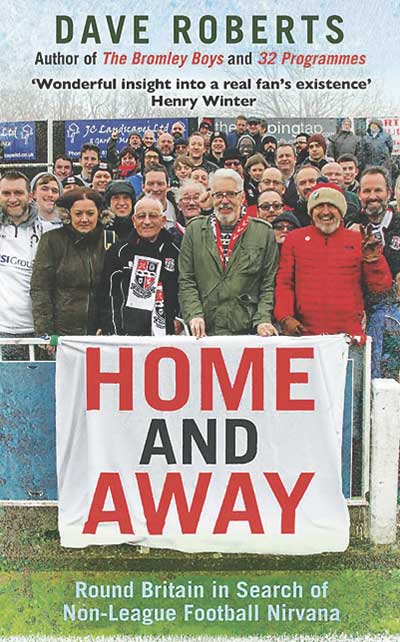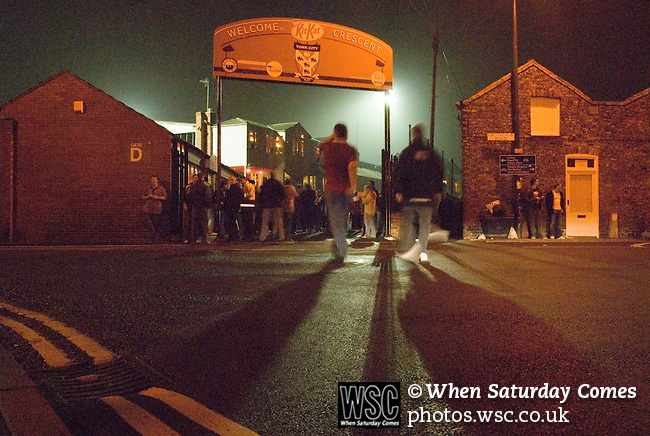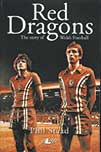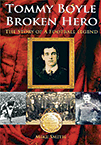
by Dave Roberts
Bantam Press, £12.99
Reviewed by Tristan Browning
From WSC 359, January 2017
Buy this book

by Dave Roberts
Bantam Press, £12.99
Reviewed by Tristan Browning
From WSC 359, January 2017
Buy this book

 The story of Welsh football
The story of Welsh football
by Phil Stead
Y Lolfa, £14.95
Reviewed by Huw Richards
From WSC 319 September 2013
The condition of Welsh football is often serious but never dull, and the same can be said of Phil Stead’s engagingly readable chronicle. It is history as one thing after another, stronger on anecdote than analysis. The prose is more solid than stylish but with flourishes such as the characterisation of Jerry Sherman, briefly and disastrously Newport County’s owner, as having “the shifty-eyed evasiveness of a potion seller at a wild west show”.
Clubs are not neglected. We learn how Wrexham got their “Robins” nickname, that Cardiff possibly sacrificed the 1924 League title to Wales call-ups and that West Ham’s “Bubbles” anthem may have been borrowed from Swansea – but this is essentially the story of the Wales team and the Football Association of Wales (FAW).
The anecdotal style works well in the early years. It introduces debonair goalkeeper Leigh Roose, who dated music hall star Marie Lloyd and conceded a Scottish winner because he was talking to a spectator, and an earlier keeper who played against England with his forearms in plaster. There are two one-armed players, a schoolmaster accidentally shot dead by a pupil and evidence of the national surname shortage, with different players called Oswald Davies on consecutive pages. One FAW secretary is imprisoned for forgery and its second president is sacked for providing insufficient support – he was the nephew of the MP and magistrate who became founding president after licensing a pub lock-in at the first meeting.
Running themes do emerge. The FAW are perennially skint, so opt for income over team priorities in locating key qualifiers. They are beset by English club obstructionism over player release, localised factionalism – Oswestry v Wrexham prefiguring Swansea v Cardiff – and they treat Llanelli’s ambitions as unsympathetically in 1958 as in 2013.
They are baffled by foreign travel. Players routinely forget passports and it is hard to forgive the official who could have averted Vinnie Jones’s Wales debut, but let him play with limited documentation. The infamous incident when player Gil Reece was bumped from a flight packed with committee men is merely the culmination of traditions exemplified by taking only 18 players, but 25 officials including the FAW secretary’s sister, to the 1958 World Cup. And then there are the qualification near-misses, that litany of dodgy Scottish penalties and doped-up Russians for which the sad but inescapable explanation is that even good Wales teams are usually not quite good enough.
Red Dragons really should have an index but there are few factual glitches. Stead elevates Wrexham to Division Two 45 years too early, while the Trevor Ford who gave vital evidence at the manslaughter trial after a South Wales Transport player died on the pitch in 1934 was almost certainly not the rumbustious centre-forward, ten at the time, but his father.
But these are minor quibbles. Stead doubtless once dreamed of playing for Wales, but with this book serves his nation better than many who achieved that ambition.
 The story of a football legend
The story of a football legend
by Mike Smith
Grosvenor House, £11.99
Reviewed by Alan Tomlinson
From WSC 306 August 2012
Until 2004, when Arsenal’s “Invincibles” went unbeaten through a full Premier League season, Burnley held the record for the longest undefeated run in a single season of England’s top tier. This small-town Lancashire club avoided defeat for 30 successive League games, going on to take their first championship in 1921. At the heart of this achievement was a gritty, combative Yorkshire-born midfield dynamo of Irish Catholic parentage, Tommy Boyle.
Mike Smith’s compellingly related and minutely researched biography of Boyle makes some of Burnley’s championship-winning heroes of 1960 look like pampered softies alongside this tough player, who dominated Burnley’s fortunes either side of the Great War. Boyle was a mere 5ft 7in but dominated the teams he led with a physical and psychological presence that willed his team-mates to victory. He cajoled, bullied and consistently inspired the players at Burnley, and before that at Barnsley, to the highest levels of competitive performance.
Boyle worked as a miner from the ages of 12 to 20, before signing professional terms for Barnsley. He took them to an FA Cup final against Newcastle, before a move to Burnley, who he led to Cup and League success. He was wounded in service in France, called back into action, then resumed the captaincy at Burnley, where eight of the 1914 Cup-winning team reunited for the 1920-21 triumph. For a time, Boyle had it all: the adulation of the “lasses” of the Lancashire mill-town (one of whom he married), money way beyond the reach of working men, the status of the local hero, acceptance and patronage of the local elite.
But the peak of 1921 was achieved in a climate of post-war industrial decline, and as his ageing body became less able to cope with the wear and tear of the top-flight game, his world fell apart. Fiery and brief spells as a trainer at Wrexham and then in Berlin were followed by the collapse of his marriage (after the tragic loss of an only child), unemployment and drink-fuelled aggression and violence. Boyle was committed to the local asylum under the new Mental Health Act of 1930, where he died after almost eight years of incarceration, aged 53.
This is a tragic story told well and with much revealing detail. Smith draws on an impressive range of sources in conveying this connection between the life of a community and the decline of one of its local heroes. The attribution of thoughts and reflections to Boyle is not always convincing, and some parts of the narrative are, as Smith concedes in a disclaimer, based on anecdote and the author’s imagination.
It is a long read, with match reports and lists of names that can jar the narrative flow. But Smith is to be congratulated for bringing alive a figure so typical of the fluctuating fortunes of early professional footballers, for whom the problems of adjustment after the glories of playing days so often proved insurmountable. Boyle’s story is no mere historical curiosity; reading this haunting tale, I was repeatedly reminded of Paul Gascoigne’s life after the magic was gone.
 Owen Amos on Airbus UK, the Welsh club just trying to go about their business quietly
Owen Amos on Airbus UK, the Welsh club just trying to go about their business quietlyEveryone knows the joke. The result pops up on Soccer Saturday and, within seconds, someone has cracked it. So, are they dancing in the streets of Airbus UK? They are not, but they are doing all right. The club, in the Welsh Premier League, are based at the huge Airbus aeroplane factory in Broughton, north Wales. The site, which employs 6,000 people, is a mile from the English border, and the ground is tucked away in the south-east corner.